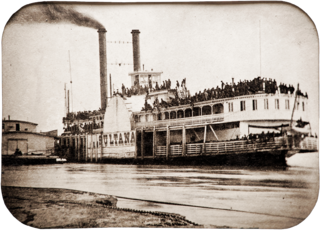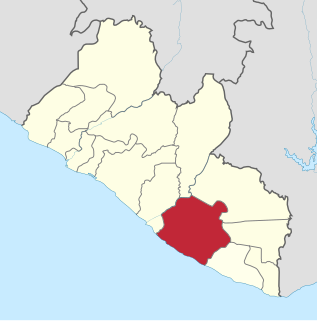Alan Huffman is an American author and journalist. [1] He is the author of five nonfiction books, three of which deal with history related to the American South. He is notable as an opposition researcher.
Alan Huffman is an American author and journalist. [1] He is the author of five nonfiction books, three of which deal with history related to the American South. He is notable as an opposition researcher.
Huffman is from Bolton, Mississippi.
He moved the Holly Grove Plantation House from near Port Gibson, Mississippi to Bolton, Mississippi in 1990. The home is listed on the National Register of Historic Places.
Ten Point: Deer Camp in the Mississippi Delta, (1997) was his first book. It is a photo-essay, exploring decades of the Issaquena County wilderness in the Mississippi Delta. Huffman wrote text as a setting for photographs by his grandmother Florence Huffman. She had frequently accompanied her husband and friends to the hunting camp, and her photos spanned the period of 1927 to 1962. After that, developers and the US Army Corps of Engineers took over the area. This territory was the setting for William Faulkner's short story "The Bear".
Mississippi in Africa: The Saga of the Slaves of Prospect Hill Plantation and Their Legacy in Liberia (2004) explores two related but different worlds of African Americans in the antebellum period. It reveals the settlement of Mississippi-in-Africa, in present-day Sinoe County, Liberia, as well as the slave world at Prospect Hill Plantation, which they left behind. This colony was initiated in the 1830s by the Mississippi chapter of the American Colonization Society, in order to relocate freed slaves out of the state. It was later incorporated into what became the independent nation of Liberia.
Sultana: Surviving the Civil War, Prison, and the Worst Maritime Disaster in American History (2009) follows four young Union soldiers through the American Civil War, including their capture and imprisonment. It culminates with their surviving the explosion and sinking of the riverboat Sultana, in which 1700 people died; it was the worst maritime disaster in American history.
We're with Nobody: Two Insiders Reveal the Dark Side of American Politics (2012), co-authored with Michael Rejebian, describes the authors' work for 18 years as opposition researchers. During this period they studied candidates ranging from presidential appointments and congressional representatives, down to people running for the local school board. They reveal an inside look at a little-understood aspect of American politics and show that they are trying to bring factual material to public light so that voters have information on candidates. [2]
Here I Am: The Story of Tim Hetherington, War Photographer (Grove Press, 2013), is a biography of photojournalist Tim Hetherington. He covered conflicts in the African nations of Liberia, Sierra Leone, Darfur, Nigeria, and Libya, as well as Afghanistan. Huffman describes Hetherington as having an artistic eye and focused on revealing the lives of his subjects, setting him apart from other conflict photographers. In addition, he was credited with Sebastian Junger) as co-director of the documentary film Restrepo, about an American base in Afghanistan, which was nominated for an Academy Award. Hetherington was killed in Libya, alongside photographer Chris Hondros, on April 20, 2011, while covering that nation's revolution.

Liberia is a country in West Africa founded by free people of color from the United States. The emigration of African Americans, both free and recently emancipated, was funded and organized by the American Colonization Society (ACS). The mortality rate of these settlers was the highest in accurately recorded human history. Of the 4,571 emigrants who arrived in Liberia between 1820 and 1843, only 1,819 survived.

Sultana was a commercial side-wheel steamboat which exploded and sank on the Mississippi River on April 27, 1865, killing 1,169 people in what remains the worst maritime disaster in United States history.

The Mississippi Delta, also known as the Yazoo–Mississippi Delta, or simply the Delta, is the distinctive northwest section of the U.S. state of Mississippi that lies between the Mississippi and Yazoo Rivers. The region has been called "The Most Southern Place on Earth", because of its unique racial, cultural, and economic history. It is 200 miles (320 km) long and 87 miles (140 km) across at its widest point, encompassing about 4,415,000 acres (17,870 km2), or, almost 7,000 square miles of alluvial floodplain. Originally covered in hardwood forest across the bottomlands, it was developed as one of the richest cotton-growing areas in the nation before the American Civil War (1861–1865). The region attracted many speculators who developed land along the riverfronts for cotton plantations; they became wealthy planters dependent on the labor of enslaved African Americans, who composed the vast majority of the population in these counties well before the Civil War, often twice the number of whites.
Chris Hondros was an American war photographer. Hondros was a finalist twice for a Pulitzer Prize for Breaking News Photography.

Sinoe is one of Liberia's 15 counties and it has 17 districts. Greenville is the county's capital. As of the 2008 Census, it had a population of 104,932, making it one of the least populous counties in Liberia. Sinoe has the third-largest area of all Liberia's counties; it has the second least-dense population after Gbarpolu County. The County was originally a colony in the name Mississippi-in-Africa, under auspices of a chapter of the American Colonization Society as it was created with slaves from Mississippi to Liberia.

Mississippi-in-Africa was a colony on the Pepper Coast founded in the 1830s by the Mississippi Colonization Society of the United States and settled by American free people of color, many of them former slaves. In the late 1840s, some 300 former slaves from Prospect Hill Plantation and other Isaac Ross properties in Jefferson County, Mississippi, were the largest single group of emigrants to the new colony. Ross had freed the slaves in his will and provided for his plantation to be sold to pay for their transportation and initial costs.

Timothy Alistair Telemachus Hetherington was a British photojournalist. He produced books, films and other work that "ranged from multi-screen installations, to fly-poster exhibitions, to handheld device downloads" and was a regular contributor to Vanity Fair.

Mississippi is a state in the Southeastern region of the United States, bordered to the north by Tennessee; to the east by Alabama; to the south by the Gulf of Mexico; to the southwest by Louisiana; and to the northwest by Arkansas. Mississippi's western boundary is largely defined by the Mississippi River. Mississippi is the 32nd largest and 35th-most populous of the 50 U.S. states and has the lowest per-capita income in the United States. Jackson is both the state's capital and largest city. Greater Jackson is the state's most populous metropolitan area, with a population of 591,978 in 2020.
African Americans in Mississippi or Black Mississippians are residents of the state of Mississippi who are of African American ancestry. As of the 2019 U.S. Census estimates, African Americans were 37.8% of the state's population which is the highest in the nation.

Stephen Duncan was an American planter and banker in Mississippi during the Antebellum South. He was born and studied medicine in Pennsylvania, but moved to Natchez District, Mississippi Territory in 1808 and became the wealthiest cotton planter and the second-largest slave owner in the United States with over 2,200 slaves. He owned 15 cotton and sugar plantations, served as President of the Bank of Mississippi, and held major investments in railroads and lumber.
For the rugby player from New Zealand, see Isaac Ross.
James Martin Brabazon, is a British documentary filmmaker, journalist, and author.
Norma C. O'Bannon High School is a public junior and senior high school located in unincorporated Washington County, Mississippi, USA, adjacent to Greenville. The school is part of the Western Line School District. The school includes students in grades 7 through 12.
The Prospect Hill Plantation was a former 5,000-acre plantation in Jefferson County, Mississippi. In the early 19th century, the plantation was owned by planter Isaac Ross of South Carolina, who enslaved African American people to farm cotton as a cash crop. In 1830, Ross and other major planters co-founded the Mississippi chapter of the American Colonization Society, which sought to move enslaved people to Mississippi-in-Africa, a colony on the coast of what became Liberia.
East Side High School was a senior high school in Cleveland, Mississippi, within the Mississippi Delta region. It was a part of the Cleveland School District and the building itself remains such as a middle school. In September 2017, it was merged into Cleveland Central High School.
Americo-Liberian people or Congo people or Congau people in Liberian English, are a Liberian ethnic group of African-American, Afro-Caribbean, and Liberated African descent. The sister ethnic group of Americo-Liberians are the Sierra Leone Creole people, who share similar ancestry and related culture. Americo-Liberians trace their ancestry to free-born and formerly enslaved African Americans who emigrated in the 19th century to become the founders of the state of Liberia. They identified there as Americo-Liberians. Some African Americans following resettlement in Canada also participated as founding settlers in Sierra Leone and other Recaptive repatriates settled in present-day Côte d'Ivoire.
Florence Carson Warfield Sillers was an American socialite and historian. A member of an influential American family with colonial ties, Sillers was a prominent figure of Mississippi society and was a founding member of the Mississippi Delta Chapter of the Daughters of the American Revolution. She was a member of multiple lineage and historical societies including the Colonial Dames of America, the National Society Magna Charta Dames and Barons, and the Mississippi Historical Society. In 1948 she published the History of Bolivar County, Mississippi, a book on the history of Bolivar County that glorified the Confederacy and contributed to the Lost Cause narrative.

Liberia–Turkey relations are the foreign relations between Liberia and Turkey. The Turkish ambassador in Accra, Ghana is also accredited to Liberia since 2013. Liberian Embassy in Brussels is accredited to Turkey. Turkey will be opening an embassy in Liberia’s capital Monrovia 'as soon as possible.'

Louis Kossuth Atwood was a lawyer, minister, teacher and state legislator in Mississippi.
Mississippi in Africa: The Saga of the Slaves of Prospect Hill Plantation and Their Legacy in Liberia Today is a 2004 non-fiction book by Alan Huffman, published by the University Press of Mississippi. It chronicles Americo-Liberians who originated from the Prospect Hill Plantation in Mississippi and who settled Mississippi-in-Africa.